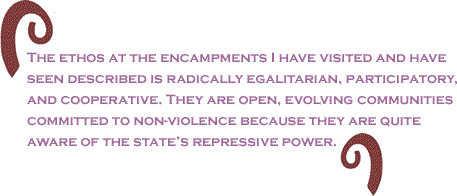| Occupy
Wall Street (“OWS”)
is a social movement begun September 17, 2011 by a handful
of protestors who encamped at “Liberty Square” in lower
Manhattan. In a month it has spread to over a thousand actions
across the United States.
It is also denominated as the 99% as against the 1% of the wealthiest and
highest earning Americans who, along with finance capital,
are perceived as having excess power over U.S. and global
governance. This 1% is identified as the source of the misery
of the global majority.
 Since
its inception I have followed the uprising through social
media and also in what she who shall not be named calls
the lamestream media. Since
its inception I have followed the uprising through social
media and also in what she who shall not be named calls
the lamestream media.
I have observed a general meeting or two at the Oakland and San Francisco,
California, Occupy/Decolonize encampments. I have also visited
the Berkeley encampment. This writing is solely my own reading
based on these observations and others’ writings.
AdBusters and author/activist David Graeber are credited with providing
the spark for the uprising.
The movement draws inspiration from other recent people’s rebellions like
those of the Arab Spring particularly in Tunisia and Egypt,
against austerity in Greece and France and the U.K., and
Chile and Spain’s Indignados. Connections are also made
to the global justice protests at Seattle, Toronto and elsewhere
in the late 1990s and early 2000s.
Solidarity statements and actions for OWS have already come from players
in U.S. organized labor and the broader U.S. left.
Demonstrations of solidarity with OWS also occurred on October 15-16 in
Lahore, Seoul, Madrid, London, Hong Kong, Rome, and elsewhere.
Another global day of action is apparently being planned
for October 29 to precede the next G20 summit scheduled
at Cannes.
The ethos at the encampments I have visited and have seen described is
radically egalitarian, participatory, and cooperative. They
are open, evolving communities committed to non-violence
because they are quite aware of the state’s repressive power.
They are also sites for deep conversation, “free schools,”
cultural performance and production, and even for dancing
in the streets.
The carnival aspect does not derogate from these encampments’ projects
of self-rule based on consensus, or at least an aspiration
to that process of decision-making. To varying degrees
Occupy/Decolonize encampments assert autonomy from the state and thus eschew
police presence and protection. In the U.S., the violence
that has occurred has come from police repression.
Communications, like the Declaration of the Occupation of New York City,
September 29, 2011, are also adopted through the consensus
process. They receive wide distribution through social media
networks nationally and globally. What other communiqués
will emerge, and from where, remains open.
The decolonization critique of OWS has two components. The first is stated
in the slogan, “Take Back Wall Street: Occupied Since 1625.”
The major premise is that the economic and social development
of the present U.S. order originates in white settler colonization.
A minor premise is that the invention of racism served as
ideological justification for both conquest and enslavement
and that racism still prevails in Occupied America.

The second component is based on experiences, and criticism based on those
experiences, by people of color participants in the Occupy
general assemblies. This part of the critique centers how
male, heterosexual, class, and especially white racial privilege
exclude the histories and experiences of women and queer
people of color in articulating the uprising’s politics.
Thus, a call to “Occupy America” obscures the histories of colonization
and resistance that U.S. indigenous and people of color
communities often carry with them. The slogan “Occupy Everywhere”
also unfortunately evokes colonialist projects. The phrase
“Occupy Together” – used by an unofficial online coordination
project –avoids this danger by inviting everyone’s participation.
Participatory democracy and consensus-based decision-making require significant
leisure. That leisure can come from wealth, or student status,
or unemployment. Most with jobs or families – unless they
are homeless and living in poverty - will find it difficult
either to follow or to participate in the on-site Occupy/Decolonize
conversations. That does not render the conversations unimportant.
By claiming to be the dispossessed and disenfranchised 99% - a claim that
hundreds of thousands around the world have found compelling
enough to find ways to support the movement and its physical
articulation as local encampments including financially
– the participants have clearly struck a nerve.
The opportunity that the Occupy/Decolonize encampments provide is for people
from diverse racial backgrounds and class positions to learn
together and articulate a new democratic politics to transform
society. It is this potential unleashed by OWS
for the liberatory imagination to work and to transform
our world that has captured so many imaginations not only
in the U.S. but in other countries as well.

BlackCommentator.com Guest Commentator, Dr. John Hayakawa Torok, JD, PhD, is a critical race theorist and card-carrying
member of the USA Green Party, who lives in Oakland, California. Click here to contact Dr.
Torok.
|

